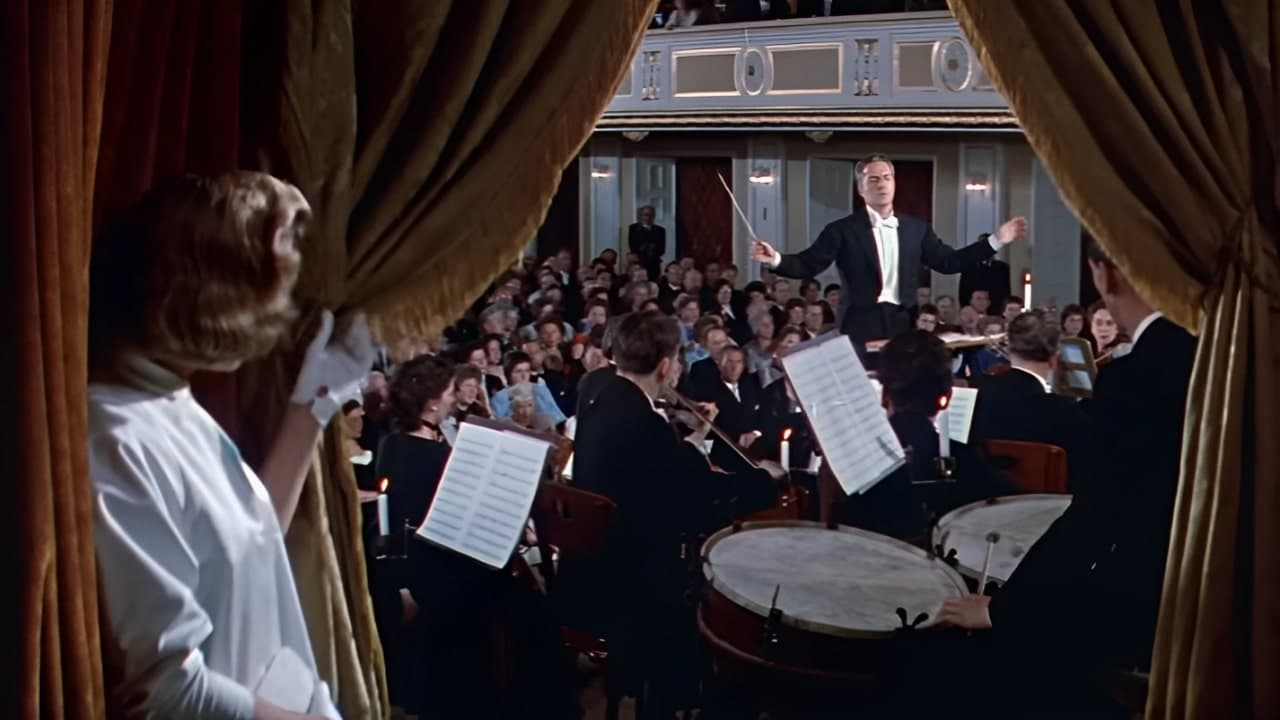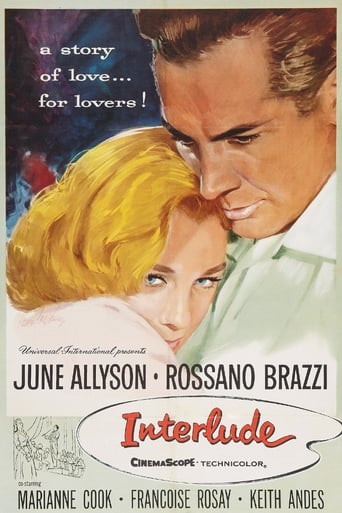Flyerplesys
Perfectly adorable
Brightlyme
i know i wasted 90 mins of my life.
Tedfoldol
everything you have heard about this movie is true.
Larkrise
I,m possibly the only person who has seen this film and really enjoyed it from the fabulous scenery of Salzburg and Munich to the romance of the story. As one reviewer commented it is an, and i never noticed it before how blind i am its so similar to Jane Eyre only with a slight difference she does,nt land up with Rochester at the end. June Allyson has always been one of my favourite actresses and she is reunited with her co star from the 1949 classic Little Women. I am familiar with othier notable films from director Douglas Sirk Written in the Wind and such and dream to put this one down. Im so happy i received a copy of this on DVD to cherish forever. Just One reviewers opinion of a favourite movie.
dbdumonteil
A propos of "when tomorrow comes" ,of which "interlude" is the remake: This is not one of Stahl's best works.The movie lacks a center of gravity. Melodrama interferes with social topics(unions,strikes,meetings)and even a deluge,complete with a night in a temple.Besides,the Madeleine character appears too late and is hardly credible.She suffers from mental illness since she lost her child.And the unfortunate heroine tells her so:"you win because you're helpless". Charles Boyer plays the usual Latin lover,and Irene Dunne,the impossible love ,as she did in Fannie Hurst's famous tear-jerker. The ending is ambiguous:in his 1957 remake,the by now usual Sirk remake has a more definitive conclusion. All in all,watchable,because of the cast ,but not a great Stahl. A propos of "interlude" : Generally Sirk used to work wonders with his remakes of John M Stahl: "magnificent obsession" and 'imitation of life" (in spite of some reservations for the latter) were ,in several respects ,superior to the thirties works ;"interlude" ,on the other hand ,is less interesting than the original,which was not a masterpiece either.Gone are the social concern,the hurricane and the flood -replaced by a little storm- We're left with an old maid (June Allyson whose performance is mediocre and no romantic at all )two suitors (an Italian buck and a handsome American physician ),plus a depressive woman ,which makes some of the final scenes look like an updated Jane Eyre .It's extraordinary that this bland soap opera should precede ,in Sirk 's filmography ,his absolute masterpiece " a time to love and a time to die" which cannot be praised too highly: one finds it hard to believe that the two movies were made by the same director.French users will notice the presence of Françoise Rosay as the housekeeper.
MARIO GAUCI
I have to say that I wasn’t all that looking forward to this romantic melodrama – in view of the fact that it bore the triple threat of classical music, travelogue aspects and a syrupy leading lady in June Allyson! However, director Sirk’s typically glossy handling smooths over much that is icky within this type of film; furthermore, male lead Rossano Brazzi is well-cast as the brooding conductor with a mad wife (Marianne Koch, from A FISTFUL OF DOLLARS [1964]!) – looked after by sympathetic aristocratic relative Francoise Rosay – who tries to console himself with ingénue Allyson (she’s unaware of this set-up, while being herself pursued by doctor/childhood friend Keith Andes). Actually, it’s this element – redolent of “Jane Eyre” – which gives the film its substance; interestingly, while Koch’s character only really emerges during the second half, she’s given a couple of powerful/moving confrontation scenes with Allyson (who even saves her from suicide at one point).INTERLUDE (a remake, as were a number of Sirk’s famed Ross Hunter collaborations, of the Oscar-winning WHEN TOMORROW COMES [1939] – based on a story by, of all people, thriller expert James M. Cain!) doesn’t wholly escape cliché, however: while initially gruff towards the heroine, Brazzi then tells Allyson he had noticed her immediately and, to make amends, takes the girl sightseeing (the film naturally makes the most of its attractive European locations) and, later, after a romantic picnic is disrupted by a thunderstorm, the couple get to spend the night in a cottage of his conveniently situated nearby. Other resistible ingredients are Jane Wyatt’s mercifully brief appearance as Allyson’s eccentric superior at work (a library within the American Embassy in Monaco), the way most patrons are seen gushing at Brazzi’s talent (he’s merely a conductor, for cryin’ out loud, not a composer or a musical performer!) and, of course, the obligatory title song. By the way, this old-fashioned plot would turn up on the screen yet again – in Britain but under the same title – in 1968 and that version has the benefit of an intriguing cast (Oskar Werner, Donald Sutherland, John Cleese and Derek Jacobi)!
Fred Sliman (fs3)
Throughout the 50's, Universal-International was home to most of director Douglas Sirk's striking views of life, love and heartache among the American classes. His work with Rock Hudson, Dorothy Malone, Barbara Stanwyck and others in superior films like Written on The Wind, The Tarnished Angels and There's Always Tomorrow is not matched here.June Allyson on occasion was able to break free from her standard persona with the fortuitous help of the right co-star, director, script turn or moment in time. Here the noble suffering and Rossano Brazzi do not provide the right formula. The stars try (probably too hard) and the trappings are predictably pretty, but the whole affair is rather unfortunately empty.

